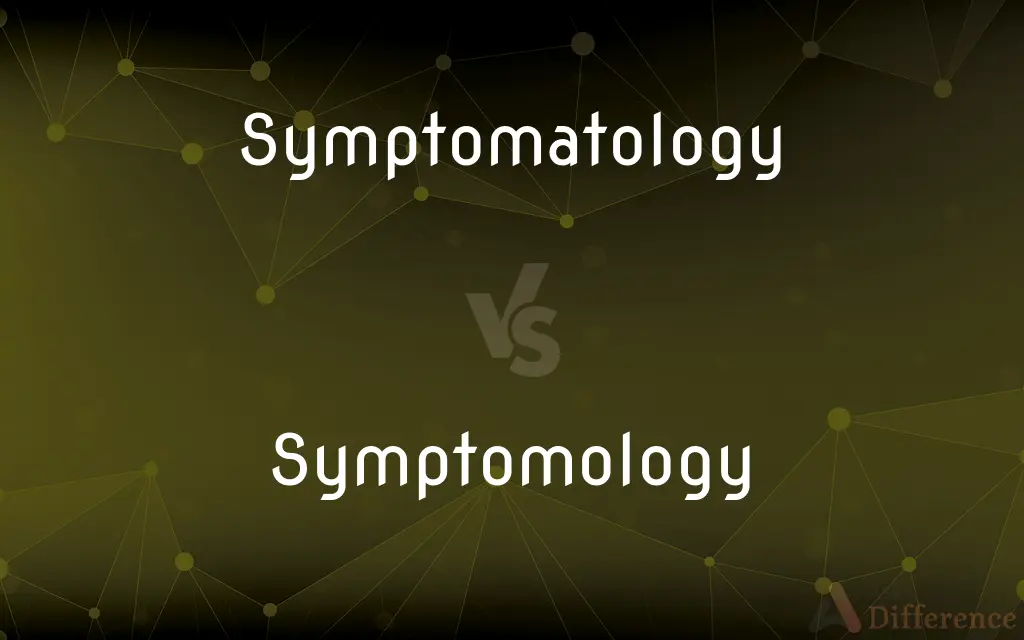Symptomatology vs. Symptomology — What's the Difference?
By Tayyaba Rehman — Updated on December 24, 2023
Symptomatology is the scientific study of symptoms, focusing on their nature, causes, and interrelations. Symptomology is a less commonly used variant of the same term, with no significant difference in meaning.

Difference Between Symptomatology and Symptomology
Table of Contents
ADVERTISEMENT
Comparison Chart
Definition
Study of symptoms in medicine
Same as symptomatology
Usage Frequency
More commonly used
Less commonly used
Context
Professional, academic, medical
Less formal, various contexts
Recognition
Widely recognized in medical literature
Less prevalent in scholarly work
Purpose
Diagnosing diseases, understanding symptom progression
Same as symptomatology
ADVERTISEMENT
Compare with Definitions
Symptomatology
Analysis of disease manifestations.
Symptomatology helps in understanding complex illnesses.
Symptomology
Study of medical symptoms.
He specializes in the symptomology of tropical diseases.
Symptomatology
Classification of symptoms for diagnosis.
The doctor used his knowledge of symptomatology to diagnose the patient.
Symptomology
Analyzing signs and symptoms in medicine.
Her interest in symptomology led to a career in research.
Symptomatology
The scientific study of symptoms.
Her research in symptomatology led to better diagnostic methods.
Symptomology
Understanding clinical presentations of diseases.
Symptomology is important in early disease detection.
Symptomatology
The combined symptoms of a disease.
Symptomology
Examination of symptom patterns.
The course covered the symptomology of autoimmune disorders.
Symptomatology
Understanding symptom patterns and causes.
Advanced symptomatology was crucial in identifying the new virus.
Symptomology
Investigating causes behind symptoms.
The symposium discussed the symptomology of emerging infections.
Symptomatology
Linking symptoms to specific medical conditions.
The symptomatology of the disease was unique and puzzling.
Symptomology
(informal) symptomatology
Symptomatology
The set of symptoms characteristic of a medical condition or exhibited by a patient.
Symptomatology
The medical science of symptoms.
Symptomatology
(uncountable) The science that studies the symptoms of diseases.
Symptomatology
(countable) The aggregate of symptoms of a particular disease.
Symptomatology
The doctrine of symptoms; that part of the science of medicine which treats of the symptoms of diseases; semeiology.
Common Curiosities
Is symptomology a newer term?
It's not necessarily newer, just less commonly used.
Why is symptomatology more commonly used than symptomology?
It's more established in medical terminology and widely accepted in academic circles.
Are symptomatology and symptomology interchangeable?
Yes, they can be used interchangeably.
Can symptomology help in early disease detection?
Yes, understanding symptom patterns can aid in early diagnosis.
Does symptomatology require medical training?
Understanding symptomatology at a professional level typically requires medical education.
Can symptomatology be used for mental health?
Yes, it applies to both physical and mental health symptoms.
Can symptomatology change over time?
Yes, as diseases evolve, their symptomatology can also change.
Is symptomatology important for general practitioners?
Absolutely, it's essential for accurate diagnosis in general practice.
Is patient history important in symptomology analysis?
Yes, patient history is crucial in understanding symptoms.
Are there courses specifically on symptomology?
Yes, many medical courses include modules on symptomology.
Can symptomatology vary between diseases?
Yes, different diseases can have distinct symptomatologies.
Can symptomatology be self-taught?
Basic concepts can be self-learned, but professional understanding requires formal education.
Is symptomology used in developing treatments?
Yes, understanding symptoms is key to developing effective treatments.
Do nurses study symptomology?
Yes, nurses learn about symptomology as part of their training.
Can symptomatology be specific to certain populations?
Yes, symptoms can vary based on factors like age, genetics, and environment.
Share Your Discovery

Previous Comparison
Tsp vs. Tbsp
Next Comparison
Collarbone vs. ClavicleAuthor Spotlight
Written by
Tayyaba RehmanTayyaba Rehman is a distinguished writer, currently serving as a primary contributor to askdifference.com. As a researcher in semantics and etymology, Tayyaba's passion for the complexity of languages and their distinctions has found a perfect home on the platform. Tayyaba delves into the intricacies of language, distinguishing between commonly confused words and phrases, thereby providing clarity for readers worldwide.
















































